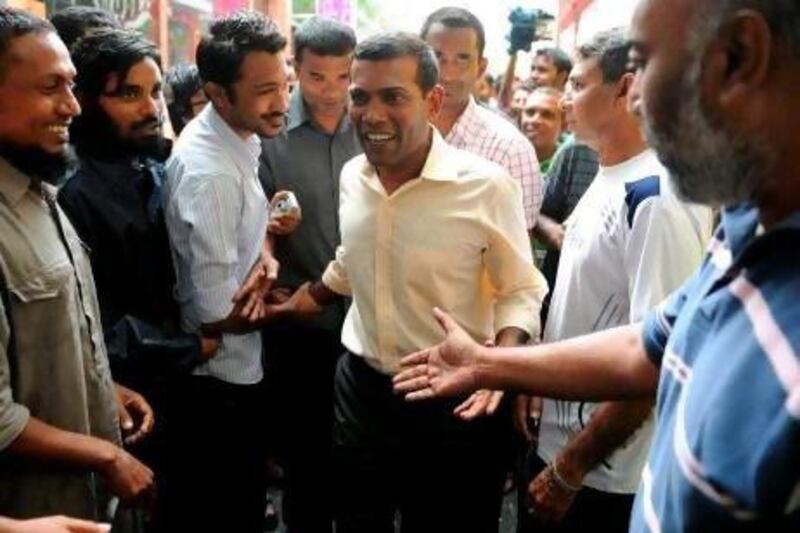MALE // A Maldives court issued an arrest warrant yesterday for the former president, who resigned this week but later insisted he had been ousted by coup plotters in a political dispute that sparked rioting.
The police spokesman, Abdul Mannan Yousuf, refused to disclose the grounds for the criminal court's warrant, or say when Mohamed Nasheed - who is living at his Male home, surrounded by supporters - would be arrested. Later, the police commissioner, Abdullah Riaz, said it was not clear if the warrant was constitutional. He declined to provide details, but said the warrant's legality was still being examined.
Rioters had rampaged through the streets of the Maldives capital on Wednesday to demand Mr Nasheed's return, and more had attacked police stations in remote parts of this 1,200-island archipelago nation off the southern coast of India.
Mr Nasheed says he was forced to resign on Tuesday while his successor's government maintains he left voluntarily.
The dispute has plunged the mostly Muslim nation of 300,000 people into political turmoil that could threaten its crucial tourism industry, which relies on dozens of high-end resorts that cater to the rich and famous.
The developments also raise questions about the future of a fledging democracy that only recently shed a 30-year, one-man rule with multiparty 2008 elections that brought Mr Nasheed to power.
The city was calm but tense yesterday, with the streets of Male crowded with commuters. Police said the violence in outlying islands had stopped.
But the new defence minister vowed to punish those responsible for Wednesday's violence, calling the destruction "acts of terrorism".
"The Maldives national defence force remains vigilant in enforcing the law and order and upholding the constitution of the Maldives," Mohammed Nazin said yesterday, barely 12 hours into his new job.
What really happened to Mr Nasheed, a one-time human rights campaigner, remained unclear. He resigned on Tuesday, after police joined months of street protests against his rule and soldiers defected, but insisted he had not been forced from power. He was replaced by his vice president, Mohammed Waheed Hassan Manick.
On Wednesday, though, Mr Nasheed said he had been ousted in a coup, and his supporters swept into the streets of Male and rampaged through a series of small, remote islands. Mr Nasheed's wife fled on Wednesday to Sri Lanka, according to Bandula Jayasekara, the Sri Lankan presidential spokesman.
The new government insists there was no coup.
The Maldives police commissioner, Abdullah Riyaz, said 18 police stations on several islands, along with an undetermined number of court houses and police vehicles, were destroyed in the violence. Police said they detained 49 people after the Male rioting.
"The ballot should decide, not battles," Mr Nasheed told reporters yesterday. He said he would challenge in 2013 elections, and was confident he would win.
Mr Nasheed's party insisted his ouster was engineered by rogue elements of the police and supporters of the country's former autocratic leader, whom Mr Nasheed defeated in the Maldives' first multiparty elections in 2008. Others blamed Islamist extremists in the country where some have demanded more conservative government policies.





